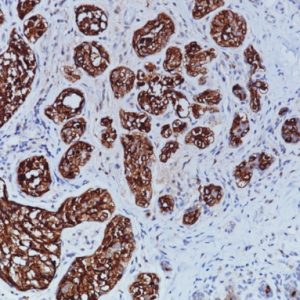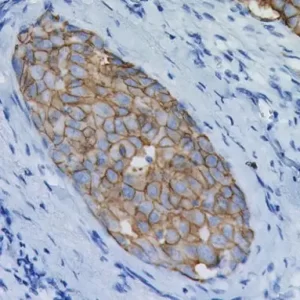Description
GATA-3 antibody (GATA binding protein 3) is a member of the GATA family of transcription factors. GATA-3 appears to control a set of genes involved in the differentiation and proliferation of breast cancer. The expression of GATA-3 has a strong association with estrogen receptor-alpha expression in breast cancer and evidence exists that GATA-3 may be used to predict response to hormonal therapy of breast cancer patients. GATA-3 has also been shown to be a novel marker for bladder cancer. In one study, GATA-3 stained 67% of 308 urothelial carcinomas but no prostate or renal carcinomas.
SPECIFICATIONS
Specifications
| WEIGHT | N/A |
|---|---|
| DIMENSIONS | N/A |
| INTENDED USE | IVD |
| SPECIES REACTIVITY | Human |
| SOURCE | Mouse Monoclonal |
| CLONE | L50-823 |
| ISOTYPE | IgG1/kappa |
| ANTIGEN | Peptide between trans-activation and DNA-binding domains of GATA-3 |
| LOCALIZATION | Nuclear |
| POSITIVE CONTROL | Bladder cancer and breast cancer |
DATASHEETS & SDS
| Download Data Sheet |
| Download RUO Data Sheet for International |
| Download SDS Sheet |
Regulatory Notice: Biocare’s IVD-labeled products comply with US-FDA and European IVDD regulation. Other regions may have additional requirements for such labeling, please contact your local distributor.
ONCORE PROTOCOL
| ANTIBODY | DOWNLOAD |
|---|---|
| Download Oncore Protocol |
REFERENCES
1. Raspollini MR, et al. The use of placental S100 (S100P), GATA3 and Napsin A in the differential diagnosis of primary adenocarcinoma of the bladder and bladder metastasis from adenocarcinoma of the lung. Pathologica. 2010 Feb; 102(1):33-5.
2. Esheba GE, et al. Expression of the urothelial differentiation markers GATA3 and placental S100 (S100P) in female genital tract transitional cell proliferations. Am J Surg Pathol. 2009 Mar; 33(3):347-53.
3. Albergaria A, et al. Expression of FOXA1 and GATA-3 in breast cancer: the prognostic significance in hormone receptor-negative tumours. Breast Cancer Res. 2009; 11(3):R40.
4. Kouros-Mehr H, et al. GATA-3 links tumor differentiation and dissemination in a luminal breast cancer model. Cancer Cell. 2008 Feb; 13(2):141-52.
5. Voduc D, et al. GATA-3 expression in breast cancer has a strong association with estrogen receptor but lacks independent prognostic value. Cancer Epidemiol Biomarkers Prev. 2008 Feb; 17(2):365-73.
6. Parikh P, et al. GATA-3 expression as a predictor of hormone response in breast cancer. J Am Coll Surg. 2005 May; 200(5):705-10.
7. Center for Disease Control Manual. Guide: Safety Management, NO. CDC-22, Atlanta, GA. April 30, 1976 “Decontamination of Laboratory Sink Drains to Remove Azide Salts.”
8. Clinical and Laboratory Standards Institute (CLSI). Protection of Laboratory workers from occupationally Acquired Infections; Approved guideline-Third Edition CLSI document M29-A3 Wayne, PA 2005.







Reviews
There are no reviews yet.